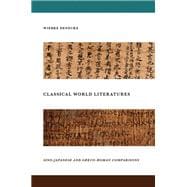Ever since Karl Jaspers's "axial age" paradigm, there have been a number of influential studies comparing ancient East Asian and Greco-Roman history and culture. However, to date there has been no comparative study involving multiple literary traditions in these cultural spheres. This book compares the dynamics between the younger literary cultures of Japan and Rome and the literatures of their venerable predecessors, China and Greece. How were writers of the younger cultures of Rome and Japan affected by the presence of an older "reference culture," whose sophistication they admired, even as they anxiously strove to assert their own distinctive identity? How did they tackle the challenge of adopting the reference culture's literary genres, rhetorical refinement, and conceptual vocabulary for writing texts in different languages and within distinct political and cultural contexts?
Classical World Literatures captures the striking similarities between the ways early Japanese authors wrote their own literature through and against the literary precedents of China, and the ways Latin writers engaged and contested Greek precedents. But it also brings to light suggestive divergences that are rooted in geopolitical, linguistic, sociohistorical, and aesthetic differences between early Japanese and Roman literary cultures. Proposing a methodology of "deep comparison" for the cross-cultural comparison of premodern literary cultures and calling for an expansion of world literature debates into the ancient and medieval worlds, Classical World Literatures is both a theoretical intervention and an invitation to read and re-read four major literary traditions in an innovative and illuminating light.








